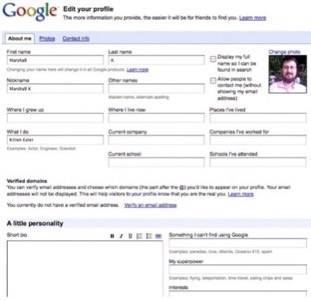Google me? I’ll Google you! Google has become the de facto public record these days but most people remain in relative obscurity there and/or fear of what past indiscretions Google will expose to people who search for them.

Today Google released a product, called Google Me, that aims to change all of that. For a price – though not a monetary one.
Starting today, searchers who enter only the word “me” in the search box will be given an opportunity to set up or edit their Google Profile.
When someone searches for a name that matches a Google Profile, that profile may now be displayed at the bottom of the search results page.

Google Profiles have a lot of potential as big, standardized online identities. They are tied to online accounts on other websites and they contain lots of interesting information about people. There’s a lot of potential for outside developers to build interesting things on top of these profiles. See, for example, Glenn Jones’s awesome project Identify, something we wrote about this weekend.
We’re a little concerned, though, about yet another way that Google is going to gather more information about us as individuals.
A Deal With the Devil?
Ask almost anyone if they would like to be able to change the Google results for their name and you’ll get a hearty “Yes.” What would they mean by that? Probably that they would like to have the ability to remove unsavory information about themselves from the Google index.
That is certainly not what Google Me offers! The program offers people control over their search appearance only in as much as they are willing to give Google more information about themselves. Google’s Joe Kraus explained to us that up to four Google Profiles will appear at the bottom of a results page. For people with common names, the more information you’ve filled out in your Google Profile – the more likely your profile will be selected for display.

Thus the offer of more control over your Google persona is an illusion – you only get to hope to influence it by giving up even more information about yourself to Google. “You don’t like how much we know about and tell other people about you? Well you can change that…by telling us more about you.”
The offer isn’t even that exciting so far. By placing the Profiles at the bottom of search results pages Google leaves the primary source of information about us, the top 5 results on the page, unchanged.
We’ll probably take this opportunity to spruce up our Google Profiles, in large part in hopes that the data will prove useful for future data-centric innovation. When asked about that, Google’s Kraus told us that “Google doesn’t do a lot of forward looking things; we serve our users’ needs and then we iterate.”
We simply don’t believe that. We think that a discussion of Google’s long-term interests in accessing personal data and our interest in letting them do so would be a good idea.
















